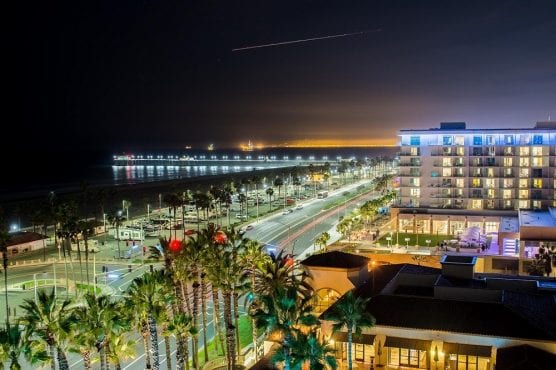In what may ultimately be a setback for the Trump administration’s immigration policies, a California appeals court found Friday that the state’s so-called “sanctuary state” law barring local law enforcement from working with federal immigration agents is constitutional when applied to charter cities.
Several California charter cities sought to put their own rules on the books vowing to comply with federal agents performing immigration-related enforcement with a court order rather than follow state law. Several cities including the coastal community of Huntington Beach sued the California Attorney General’s Office claiming Senate Bill 54, the California Values Act, restricted police action in order to protect undocumented immigrants from strict federal immigration policies.
Also referred to as the “sanctuary state” law, SB 54 prohibits state and local law enforcement from cooperating with immigration agents without a court order and creates safe zones around schools, courts and hospitals. The bill was written by then-state Senate leader Kevin de León, a Democrat from Los Angeles, and was signed by then Gov. Jerry Brown in 2017.
In an opinion published Friday, a Fourth Appellate District panel reversed an Orange County Superior Court judge who found the California Attorney General’s Office cannot force the state’s 121 charter cities to comply with SB 54 because it violates the state constitution.
Writing for the majority, Associate Justice Richard Fybel found the California Values Act “is narrowly tailored and does not intrude unnecessarily into municipal interests” and does not restrict local authorities from giving federal immigration officials information about a person’s citizenship or immigration status.
“The CVA does not prohibit all local law enforcement activity related to immigration or a person’s immigration status, but only prohibits such activity to the extent necessary to resolve the statewide concerns identified by the Legislature,” Fybel wrote in a 44-page opinion.
In a statement, Huntington Beach City Attorney Michael Gates said his office is disappointed by the court’s decision that “incorrectly subordinates and subjects rights expressly provided by the California Constitution to Charter Cities to a judicially created ‘test.’”
“If this fight for constitutional rights does not continue here and in other cities, then the state will eventually literally be able to dictate every aspect of local governance, which would render local governance pointless,” said Gates.
He will next take the matter to the Huntington Beach City Council to decide whether to appeal to the California Supreme Court.
In a statement, California Attorney General Xavier Becerra said Friday’s decision keeps the state’s “public safety laws fair and consistent” and his office will continue to enhance trust between law enforcement and communities they serve.
“As the appellate court noted, SB 54 is constitutional and furthers the state’s interests in addressing matters of statewide concern – including public safety and health, effective policing, and protection of constitutional rights,” Becerra said.
In justifying SB 54, the California Assembly Committee on Public Safety summarized a study from the University of Illinois that found 44% of surveyed Latinos who said they were less likely to contact police if they become victims of a crime due to fear of police asking about their immigration status. Seventy percent of undocumented immigrants said they were less likely to report to police if they were victims of a crime.
The appellate panel took note of this in reversing the trial court’s writ.
“Immigrants live throughout the state of California and, as the Legislature found, are a large portion of its population. Law enforcement agencies throughout the state interact with immigrants. The need for immigrants to report crimes, work with law enforcement, and serve as witnesses, is therefore a statewide, and not purely local, concern,” Fybel wrote.
Jessica Bansal, senior staff attorney with the American Civil Liberties Union Foundation of Southern California, called Friday’s decision a “resounding victory for sanctuary” in the Golden State.
In a statement, Bansal said, “The appellate court decision affirms that all Californians – including the millions living in charter cities – are entitled to the California Values Act’s protections. We are especially thankful to the many Orange County residents and community organizations who stood up to defend sanctuary in their communities.”
The Trump administration filed its own challenge of portions of the sanctuary state law in March 2018, fighting a provision that bars employers from releasing the immigration status of their employees and legislation that authorizes state inspections of federal detention facilities operating in California.
The federal government claimed the law “obstructs” and “impedes” federal immigration agents and violates the Supremacy Clause of the U.S. Constitution.
But in July 2018, U.S. District Judge John Mendez dismissed the heart of the lawsuit. The Trump administration quickly appealed to the Ninth Circuit, where it suffered another defeat from a panel consisting of George W. Bush and Barack Obama appointees.
The Ninth Circuit then denied the Trump administration’s request for an en banc rehearing of its challenge since another three-judge panel had mostly upheld the laws in April 2019. The White House has appealed to the U.S. Supreme Court, which has not decided whether to take up the case.
— By Nathan Solis
Like this:
Like Loading...
Related





 Tweet This
Tweet This Facebook
Facebook Digg This
Digg This Bookmark
Bookmark Stumble
Stumble RSS
RSS


























REAL NAMES ONLY: All posters must use their real individual or business name. This applies equally to Twitter account holders who use a nickname.
0 Comments
You can be the first one to leave a comment.